As a website dedicated to history, its sole purpose is to educate. The understanding of history is so
important to today. While circumstances and certain issues change, human nature does not. Lets take a look back at the Yonkers
Mayoral election of 1894 and you will be surprised at how much has not changed....in 115 years. Remember no one is alive today
who could tell you first hand, but much has been written, though most relegated to obscurity.... until now. This election
pitted John G. Peene, a son of a powerful Yonkers Business Family (The Peene Family) against a celebrated author, John Kendrick
Bangs famous in intellectual circles, and son of a prominent lawyer. At the time of election Mr. Bangs was 32 years old and
Mr. Peene was 50. In the end Mr. Peene won by only 207 votes, but Mr. Bangs used this short experience in Yonkers politics
to write a book "Three Weeks in Politics" (literally it was three weeks. He was nominated on March 7 and the election
was March 28!) which was highly successful and sold over 60,000 copies in its day!
As a "humorist", in his book he chose to disguise the names and places, but if you enjoy a good and laughable
look at politics and politicians, which clearly he didn't fit, you will love this short book. It's written in a high victorian
style, but a fun read. Bang's name in the book is Thaddeus Perkins and it takes place in "Phillipseburgh-on-the-Dunwoodie".
Other characters in the book like the "Idiot" and his observations, how nominations occur, how campaign headquarters
and saloons seem to go hand-in-hand, how politicians act and how once a person runs for office everyone who doesnt even know
the candidate lays claim to some act of charity they did fictitious or otherwise for the person to elicit favors.
The book is now in the public domain. There is a link at the end of this page that will allow you to download it
for free thanks to Google.
Below is an excerpt from Bang's book describing
the nomination process:
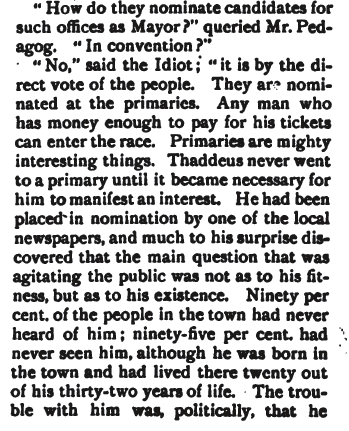
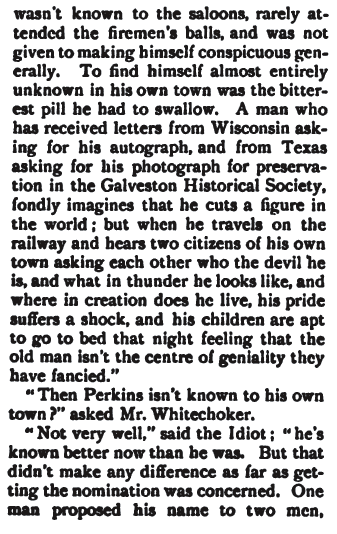
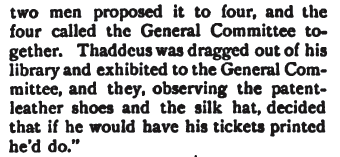
Another excerpt about losing the election and a comment about the addiction of politics. Love the comment
about the prohibition party and what they would have thought of his election night dinner refreshments!
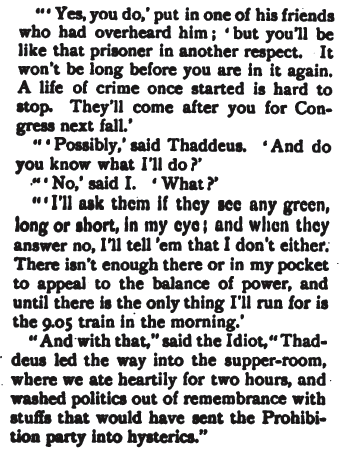
And yet one more excerpt about how easily it is to twist facts.
The Setting
In 1893 one of the greatest depressions (even more significant than the depression of 1929) was taking
its toll on the nation. It was caused by railroad overbuilding and shaky railroad financing which
set off a series of bank failures. The three major U.S. Railroads all declared bankrupcy. (any parallels here???)
Compounding market overbuilding and a railroad bubble was a run on the gold supply as people traded paper money for gold (any
parallels here....price of gold today?) and a policy of using both gold and silver metals as a peg for the US Dollar
value.
The City of Yonkers financial situation was no exception.
Its principal employer, The Alexander Smith and Sons' Carpet company had shut down for 6 months as demand for its products
dried up. Yonkers financial conditions were shaky with revenues at rock bottom given so many out of work. Remember, there
was no unemployment insurance in those times, further compounding unrest in the population at large. During the latter part
of 1894 conditions were beginning to improve although still very serious.
On another front Yonkers city government had outgrown Philipse Manor where it had operated its City Hall for some
time. (In 1894/95 there was a movement to tear it down and build a new city hall. Preservationists from all over were outraged
at the thought.)
So was the setting for the election of 1894.
There emerged two principal candidates John G. Peene a wealthy business man and a Republican (son of Capt. Joseph Peene, founder
of a major water transportation business) and John Kendrick Bangs a celebrated writer
and a Democrat (son of a powerful NYC lawyer).
The below is
from the Historical Register of 1921...... some insights about the Peene family and their prominence in Yonkers. If you were
alive at that time, the Yonkers waterfront and transportation by water was controlled by this powerful business family:
Read more about the City of Yonkers in 1894. This article promotes the city and its assets very well. CLICK HERE.
The Candidates of
1894:
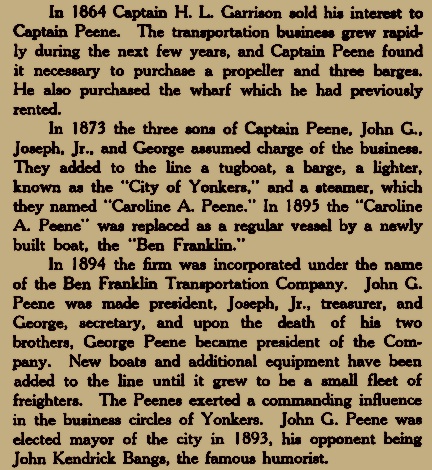
Note that the above says election of 1893... it is an error in this book... it was the election of 1894.
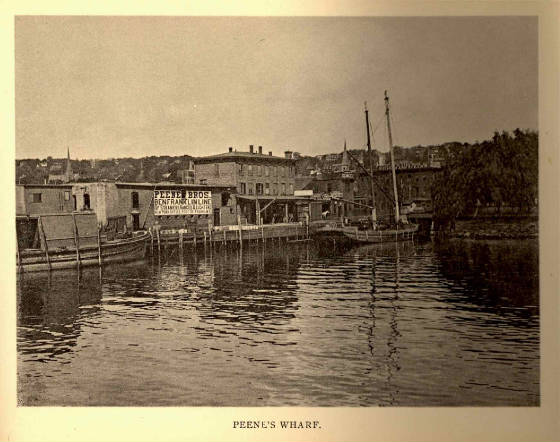
The Yonkers Waterfront Circa 1889
John G. Peene's opponent was Democrat John Kendrick
Bangs, a then celebrated magazine editor, author, and playright. He was also a law school graduate. Mr Bangs was nominated
March 7, 1894 just three weeks before the election vote. The articles below from the New York Times.
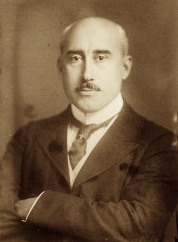
John Kendrick Bangs
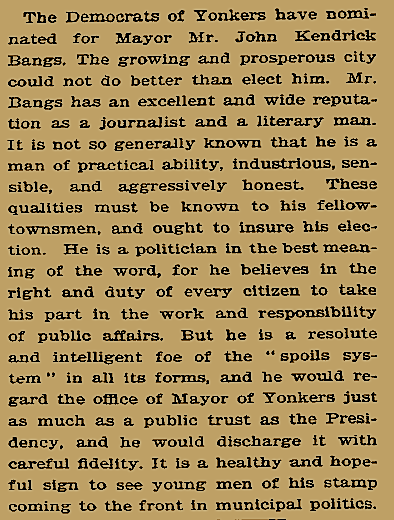
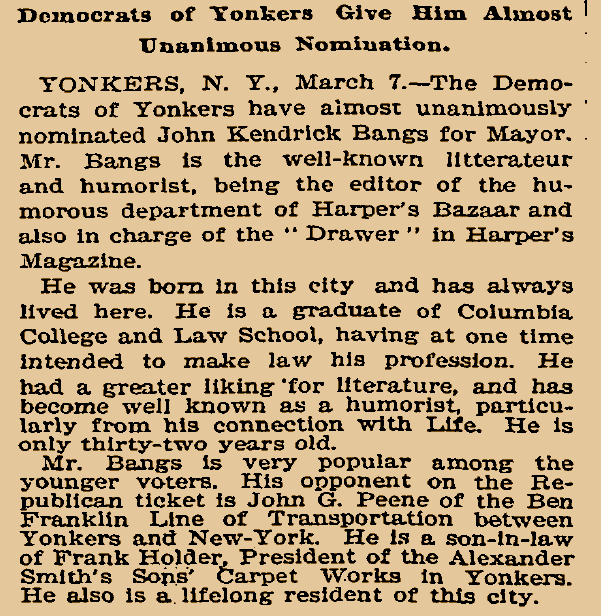
The election results of 1894 from the New York Times. Click the article to enlarge:

The following article was authored in 1899. A reporter from the New York Times traveled from Manhattan
via railroad to Yonkers (the trip took 30 minutes back then... same as today!) to interview Bangs at his home at 463 North
Braodway just above Hudson Terrace (condos exist there today). The home and its furnishings are vividly described in this
wonderful article. Keep in mind that at the time of this interview, Bangs was 37 years old. Click on the article to enlarge
it.
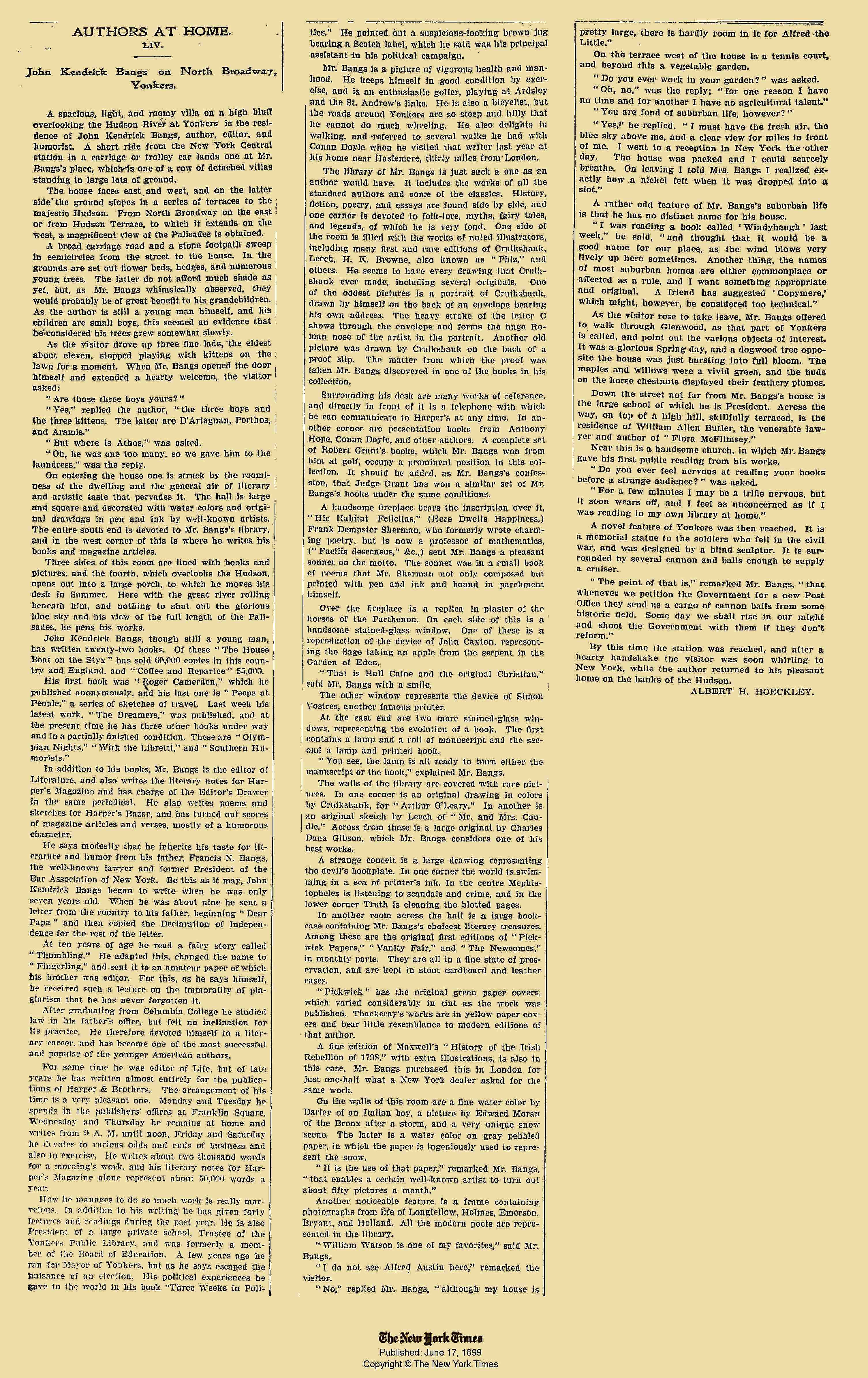
1907 Yonkers Map showing the location of Bang's home. His home was on North Broadway and cross street to the
right is Hudson Terrace.
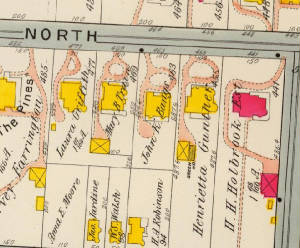
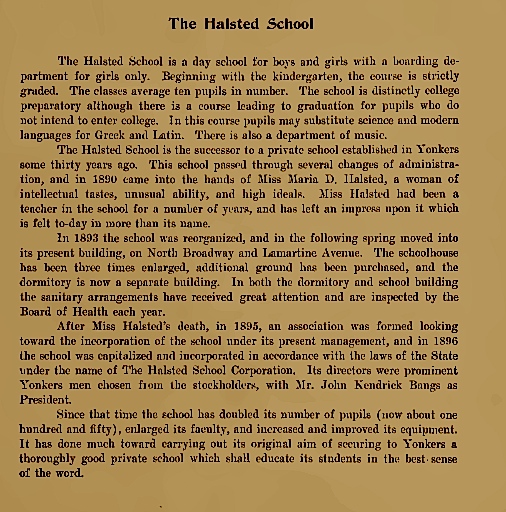
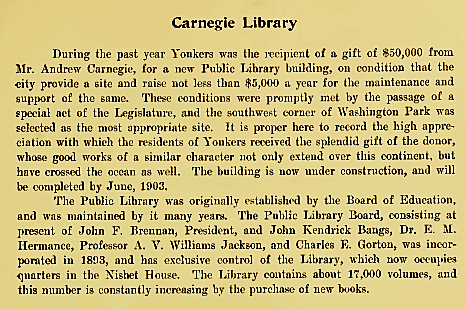
John G. Peene
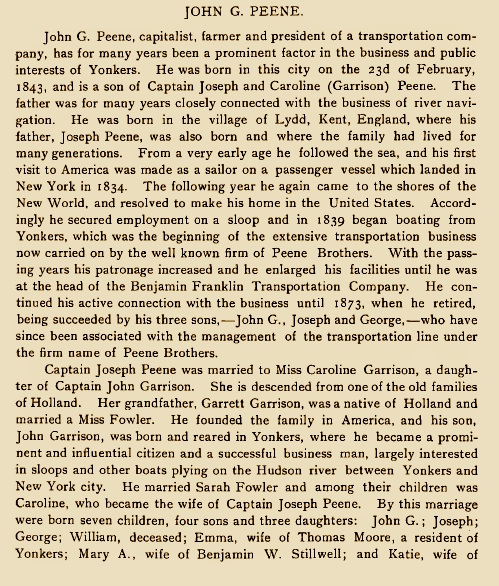
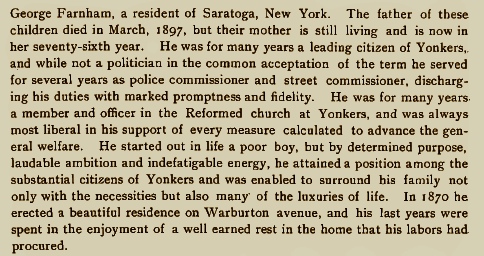
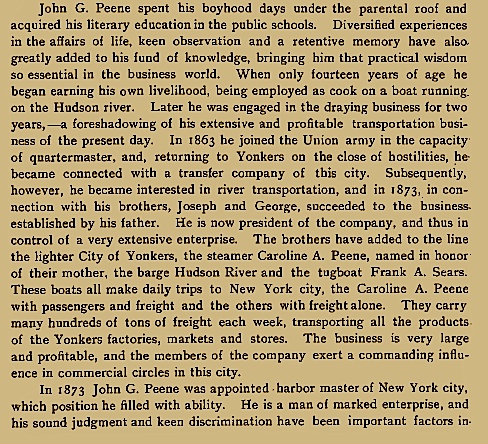
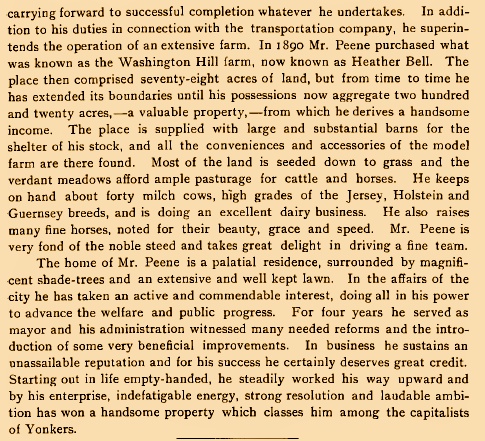
EPILOGUE:John Kendrick
Bangs was born in Yonkers, New York May 22, 1862. His father was a lawyer in New York City.
He went to Columbia University from 1879 to 1883 where he became editor of Columbia's
literary magazine and contributed short anonymous pieces to humor magazines. After graduation in 1883, Bangs entered Columbia
Law School but left in 1884 to become Associate Editor of Life under Edward S. Martin. Bangs contributed many articles and
poems to the magazine between 1884 and 1888. During this period, Bangs published his first books.
Riding on this wave of popularity, in 1894 Bangs ran for mayor of Yonkers but lost by 207 votes. He wrote a book
about his run for election entitled “Three weeks in Politics”. From 1896-1897 he was Vice President of the Yonkers
Board of Education. In 1886 he married his first cousin Agnes Lawson Hyde, who died in 1903. They had four children together.
In 1888 Bangs left Life to work at Harper's Magazine, Harper's Bazaar and Harper's Young People. From 1889 to 1900
he held the title of Editor of the Departments of Humor for all three Harper's magazines and from 1899 to 1901 served as active
editor of Harper's Weekly. Bangs also served for a short time (January–June, 1889) as the first editor of Munsey's Magazine
and became editor of the American edition of the Harper-owned Literature from January to November, 1899.
He left Harper & Brothers in 1901 and became editor
of the New Metropolitan magazine in 1903. In 1904 he was appointed editor of Puck, perhaps the foremost American humor magazine
of its day. In this period, he revived his earlier interest in drama. In 1906 he switched his focus to the lecture circuit.
Agnes Hyde Bangs, his wife died in 1903. Bangs then
married Mary Gray. In 1907 they moved from Yonkers to Ogunquit, Maine. During his lifetime he authored over 25,000 articles
and 60 books. He had many famous friends including Theodore Roosevelt, Arthur Conan Doyle, Rudyard Kipling, William Dean
Howells, and Mark Twain.
John Kendrick Bangs
died from stomach cancer in 1922 at age fifty-nine.
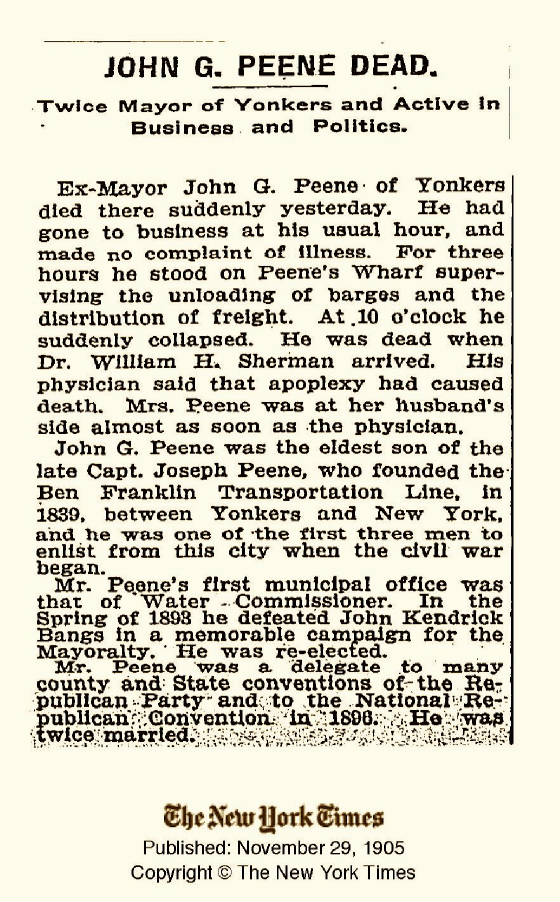
CLICK HERE to Download "Three Weeks in Politics" by John Kendrick Bangs written in 1894